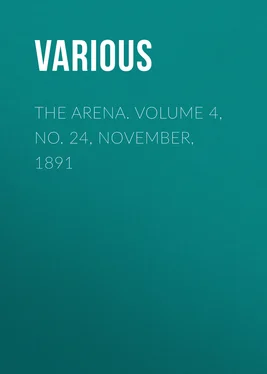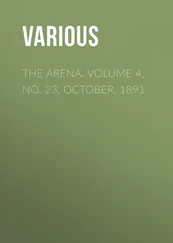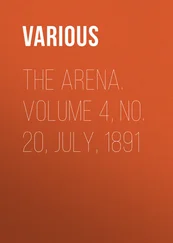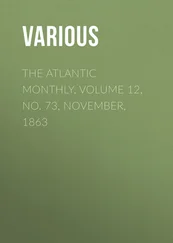Various - The Arena. Volume 4, No. 24, November, 1891
Здесь есть возможность читать онлайн «Various - The Arena. Volume 4, No. 24, November, 1891» — ознакомительный отрывок электронной книги совершенно бесплатно, а после прочтения отрывка купить полную версию. В некоторых случаях можно слушать аудио, скачать через торрент в формате fb2 и присутствует краткое содержание. Жанр: foreign_antique, periodic, foreign_edu, на английском языке. Описание произведения, (предисловие) а так же отзывы посетителей доступны на портале библиотеки ЛибКат.
- Название:The Arena. Volume 4, No. 24, November, 1891
- Автор:
- Жанр:
- Год:неизвестен
- ISBN:нет данных
- Рейтинг книги:4 / 5. Голосов: 1
-
Избранное:Добавить в избранное
- Отзывы:
-
Ваша оценка:
- 80
- 1
- 2
- 3
- 4
- 5
The Arena. Volume 4, No. 24, November, 1891: краткое содержание, описание и аннотация
Предлагаем к чтению аннотацию, описание, краткое содержание или предисловие (зависит от того, что написал сам автор книги «The Arena. Volume 4, No. 24, November, 1891»). Если вы не нашли необходимую информацию о книге — напишите в комментариях, мы постараемся отыскать её.
The Arena. Volume 4, No. 24, November, 1891 — читать онлайн ознакомительный отрывок
Ниже представлен текст книги, разбитый по страницам. Система сохранения места последней прочитанной страницы, позволяет с удобством читать онлайн бесплатно книгу «The Arena. Volume 4, No. 24, November, 1891», без необходимости каждый раз заново искать на чём Вы остановились. Поставьте закладку, и сможете в любой момент перейти на страницу, на которой закончили чтение.
Интервал:
Закладка:
Conceive that you or I shall wish to talk with the ordinary Wall Street man, on the piazza of his watering-place hotel, on the deck of his record-breaking steamer. (When he goes to Europe, which he incessantly does, he invariably takes a record-breaking steamer in preference to all others.) What does he know? What can he tell us? Politics? He reproduces, if he be a Republican, the last tirade of his favorite newspaper in behalf of protection and Mr. Blaine. If he be a Democrat he will spout the last editorial of his favorite newspaper in favor of free trade and Mr. Cleveland. History? The Wall Street man rarely knows in what year Columbus discovered America, and would be in straits wild enough to horrify that talented arch-prig, Mr. Andrew Lang, if you mentioned either Cortes or Pizarro. Fiction? He admired Robinson Crusoe when a boy, and since then he has read a few translated volumes of Dumas the elder. Poetry? He doesn’t like it “for a cent”; but he once did come across something (by Tennyson or Longfellow—he forgets which) called “Beautiful Snow.” That “fetched him,” and “laid over” any other verse he recollects.
Here, let us insist, is no aimless travesty of the average Wall Street man, but a faithful etching of him, apart from those more sorry lineaments which might be disclosed in a portrait painted, as it were, with the oil of his own slippery speculations. If he resents the honest drawing of his well-known features, why, so much the better. His indignation may be fraught with wholesome reactions. Perhaps he will have his defenders—interested ones, of course. We may pluck the cactus-flower with hands cased in buckskin, and swear that it harbors no sting below its roseate and silken cockade of bloom. Prejudice is too often the saucepan on which we cook our criticisms; and when these are done to a turn we cast the vessel into a dust-bin, trying with mighty valor of volition to forget that it even exists as old iron.
Never was more blatant humbug aired than that about our “brilliant” Wall Street financiers. Their “brilliancy” is merely a repulsive egotism in one of its worst forms,—that of cupidity. They are like misers with longer, quicker, and more sinewy fingers than other misers, in the gathering together of dollars. Their shrewdness may be exceptional, but a quality which consists half in accurate guessing and half in bullying defiance is hardly worthy of the name. As for their “nerve” and “coolness,” these are not endowments that in such connection can be admired or praised. For surely the gambler who cannot face bravely those very slings and arrows of variant if not always outrageous fortune which form the chief indices of his dingy profession, cuts a mean enough figure in the cult of it. “Jim” Fisk had traits like these, but who now applauds them? As well admire the courage of a house-breaker in scaling a garden-wall at midnight, or his exquisite tact in selecting a bed-chamber well-stored with jewels and money. The so-called “great men” of Wall Street are foes of society—foes merciless and malign. Their “generalship,” their “Napoleonic” attributes are terms coined by people of their own damaging class, people with low motives, with even brutish morals. It is time that this age of ours, so rich in theoretic if impracticable humanitarianisms, forebore to flatter the spirits which work against it in its efforts toward higher and wiser achievement. The anarchists hanged in Chicago were men of mistaken purpose and fatuous belief. But at least they were conceivably sincere, however dangerous to peace and order. These czars and tycoons of finance, on the other hand, are scoffers at the integrity of the commonweal, and have for their Lares and Penates hideous little gods carved by their own misanthropy from the harsh granite of self-worship. Every new conspiracy to amass millions through wrecking railroads, through pouring vast sums upon the stock market, through causing as vast sums to disappear from public use, stains them blacker with the proof of their horrible inhumanity. Even death does not always end their monstrous rapine, for when they pay what is called the debt of nature they too often fling, in their wills, a posthumous sneer at that still larger debt owed to their fellow-creatures, and make some eldest son their principal heir. Charity may get a few niggardly thousands from them, and handsome bequests usually go to their younger children; yet the bulk of the big gambler’s treasure passes intact to one who will most probably guard with avid custody the alleged prestige of its possession.
But we should remember that on many occasions it is not even a game of chance with these potentates of Wall Street. They play, as it were, with marked cards, and can predict to a certainty, having such mighty capital at their disposal, just how and when particular stocks will rise or fall. Spreading abroad deceitful rumors through their little subservient throngs of henchmen brokers, they create untold ravage and despair. Fearful cruelty is shown by them then. The law cannot reach it, though years of imprisonment would be far too good for it. Families are plunged into penury by their subtly circulated frauds; forgery and embezzlement in hundreds of individual cases result; banks are betrayed and shattered; disgrace and suicide are sown broadcast like seeds fecund in poison. One often marvels that assassination does not spring up in certain desperate human hearts as a vengeance against these appalling wrongs. Murder is ghastly enough, in whatever shape it meets us, and from whatever cause. But if Lincoln and Garfield fell the prey of mad fanatics, it seems all the stranger, as it is all the more fortunate, that agonized and ill-governed human frenzy should thus far happily have spared us new public shudders at new public crimes.
Conjecture may indeed waste its liveliest ardors in seeking to determine what place this nineteenth century of ours will hold among the centuries which have preceded and are destined to follow it. But there is good reason to believe, after all, that in one way it will be held remarkable, perhaps even unique,—as an age of violent contrasts, violent extremes. Here we are, seeking (however pathetically) to grapple with problems whose solution would wear an almost millennial tinge. There are men among us—and men of august intellects, too—who urge upon society the adoption of codes and usages which would assume, if practically treated, that the minds and characters of mortals are little short of angelic. And coevally with these dreamers of grand socialistic improvement, we are met by such evidence as that of Wall Street, its air foul with the mephitic exhalations that rise from dead and rotting principle. When the state is corrupt, and large bodies of its citizens are not only corrupt but wholly scornful of every fraternal and philanthropic purpose as well,—when communities like this of Wall Street, cold-blooded, shameless, injurious, are bowed to as powers, instead of being shunned as pests, then the ideals of such men as Karl Marx and his disciples loom distant and indefinite on the horizon of the future. Tritest of metaphors though it may be, all civilization is a garden, and in this garden of our own western tillage Wall Street towers to-day like a colossal weed, with roots deep-plunging into a soil they desiccate and de-fertilize. When and whose will be the extirpating hand?
Here dawns a question with which some modern Sphinx may defy some coming Œdipus. Let us hope it will prove a question so adequately answered that the evil goddess using it as a challenge—the conventional deity of injustice, duplicity, and extortion—will dramatize her compulsory response to it by casting herself headlong into the sea!
PROTECTION OR FREE TRADE—WHICH?
The advocates of free trade in this country at the present time are very unlike Emerson’s “fine young Oxford gentlemen” who said “there was nothing new, and nothing true, and no matter.” They not only believe their pet doctrine to be true, but they seem to assume that it is also new. They further treat it as if it were an exact science and a great moral question as well. Unwarranted assumptions merely confuse and this question of national economic policy is too important to be clouded with confusions. It is worth while, therefore, to look at these assumptions one by one and try, before attempting any discussion of the tariff, to clear the ground from cant and to see the question exactly as it is.
Читать дальшеИнтервал:
Закладка:
Похожие книги на «The Arena. Volume 4, No. 24, November, 1891»
Представляем Вашему вниманию похожие книги на «The Arena. Volume 4, No. 24, November, 1891» списком для выбора. Мы отобрали схожую по названию и смыслу литературу в надежде предоставить читателям больше вариантов отыскать новые, интересные, ещё непрочитанные произведения.
Обсуждение, отзывы о книге «The Arena. Volume 4, No. 24, November, 1891» и просто собственные мнения читателей. Оставьте ваши комментарии, напишите, что Вы думаете о произведении, его смысле или главных героях. Укажите что конкретно понравилось, а что нет, и почему Вы так считаете.












